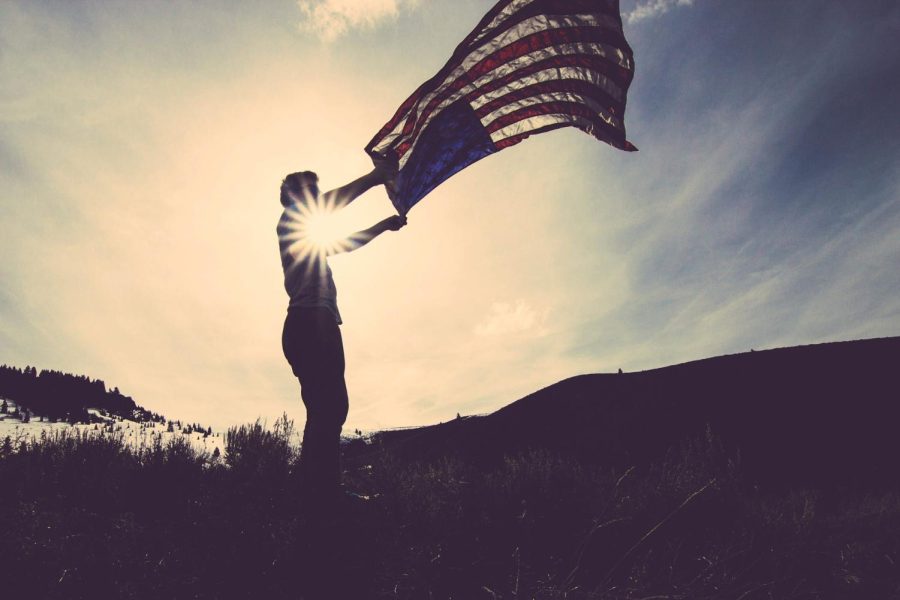Patriotism: an overrated principle
America thrives on patriotism, and that isn’t exactly a good thing.
Patriotism has its merits, but placing too much importance on it is dangerous.
September 29, 2021
“Baseball, hot dogs, apple pie, and Chevrolet” is a quaint jingle, but it is one of the most culturally relevant phrases in the decorated history of the United States, and it is unlikely that it will ever lose its luster. For centuries, the American people have been finding ways to show their appreciation for their fatherland, and although these methods are countless and diverse, they all seem to have one thing in common: the thin veil that is “patriotism.” By connotation alone, it is difficult to convey a sense of overratedness about the word, but there is a major disconnect between the literal definition of the term and its use in today’s society. There is nothing wrong with loving the place where one grew up and wanting to see it improve, but when this principle is rated too highly, it turns into something exclusionary, impractical, and downright dangerous.
The origins of patriotism in the United States date back to the American Revolution, a time when its importance could hardly be argued against. Many countries, in their quest for independence and identity, find it useful for their citizens to be united in one common pursuit. The simplicity of their goal, however, is what allows this to happen; one would be hard-pressed to find a citizen against the existence of their own nation. After this achievement, though, patriotism becomes much more complex, as the objective turns to improvement. Everyone begins to form their own ideas, and due to man’s selfish nature, unity falls apart. When a multitude of people think they know what is best for their country, they form their own view of patriotism, and the term gradually loses its meaning. The more dangerous aspect of this development, though, is that no one ditches the idea entirely. The entire nation agrees that this ideal is important, but no one has the same idea of what it means, and the citizens grow more discordant without realizing it.
Of course, this is accentuated by the fact that in this modern age, the term “nation,” which defines a group of people with a common characteristic, can hardly be applied to the United States or any other developed country. The amount of diversity around the world is rapidly accelerating, and at this point, if two Americans were placed side by side, it could be reasonably predicted that the only thing they would share is the country they live in. This reality, in effect, proves the impracticality of modern patriotism. America is no longer a group of religious separatists sailing the Mayflower to find a better life, nor is it a group of powerful white slave owners fleeing from tyrannical rule. It is simply a territory under one government that hundreds of millions of people happen to live in. Without a common identity, it is nearly impossible to find a common goal, and therein lies one of patriotism’s biggest difficulties: it is much easier to love a strong, united nation than a messy, confused governmental unit where disagreement seems to be the only constant.
The forming of factions isn’t helping things, either; with Democrats and Republicans at each other’s throats, improvement is losing focus. Today’s political rhetoric is largely combative, and patriotism is the only common denominator, as both sides seem to think they know how to fix the country, and they consider their opponents to be enemies. In a civil war like this, love for the country cannot be the saving grace, as the country is all but split in two. It can only be used as a weapon, and unfortunately, that is today’s reality. The word “patriot” has been tossed around quite liberally throughout the past few years, with a sense of malice that is somewhat frightening. When the Capitol rioters of January 6th climbed up walls and staircases, they did it with a sense of pride, and the label “great patriots” was offered to them by none other than President Donald Trump. From their point of view, they were fighting against evil, which is exactly the kind of attitude that makes patriotism dangerous. As soon as one develops an “us versus them” attitude, the focus turns from loving their own country to hating their neighbors. This sort of chauvinism can be found all around America, even outside the realm of politics; just take a look at Captain America or Rocky IV. The overuse of patriotism has turned it from an ideal into a tool that is used for hate, exclusion, and in some cases, war. The United States government is arguably the ringleader of this entire development, as they have the power to control millions of people in order to achieve their own goals. The timing of the Espionage and Sedition Acts was no mistake, nor was the unveiling of Uncle Sam. America’s most patriotic symbols often arise out of wartime efforts, and the feeling that they induce is not love, nor is it loyalty or support; it is a thinly veiled hatred that is used to murder men in battlefields with the false pretense of righteousness.
The blindness with which citizens are willing to embrace this is a slippery slope, one that America has already began to descend upon, and it is thanks to the use of “patriotism.” Without a negative connotation to provoke thought into its identity, the word can only grow more deformed and more powerful. At its core, it is a solid principle with scattered usefulness. When a country gets too passionate about it, though, it becomes something completely different, a dangerous monster that turns citizens into nationalists and love into hate. To put one’s life on the line for their country is noble, but one question must first be asked: what are they truly dying for?




Anthony Olshanski • Oct 4, 2021 at 7:57 am
This is a spectacular article!! very well written and looks through historical significance and not the use of recency bias on the term. Great Job Oliver!!